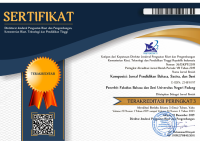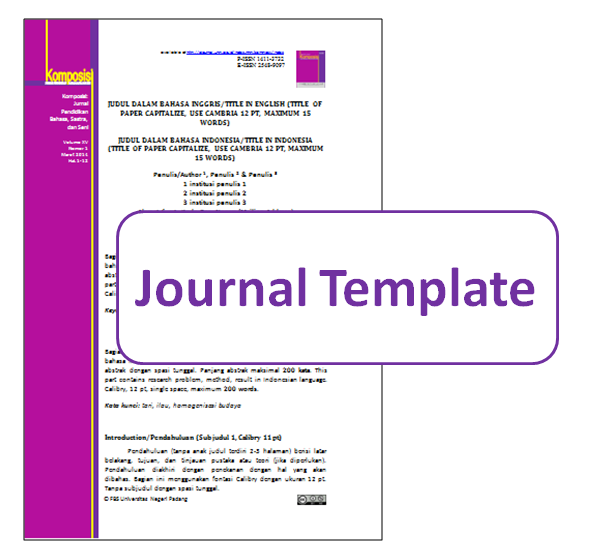Education Reconstruction: A Collaboration of Quiz Team and Kahoot Methods in Learning Arabic
Abstract
Keywords
Full Text:
PDFReferences
Adiputra, S., & Mujiyati, M. (2017). Motivasi dan Prestasi Belajar Siswa di Indonesia: Kajian Meta-Analisis. Konselor, 6(4), 150–157. https://doi.org/10.24036/02017648171-0-00
Aflisia, N., Karolina, A., & Yanuarti, E. (2020). PEMANFAATAN APLIKASI KAHOOT UNTUK MENINGKATKAN PENGUASAAN UNSUR BAHASA ARAB. Al-Muktamar As-Sanawi Li Al-Lughah Al-’Arabiyyah (MUSLA), 1(1), 1–17.
Alsa, Y. I. (2004). Pengaruh Kualitas Asset dan Liabilitas Terhadap Kinerja Perbankan Syariah [PhD Thesis]. Program Pasca Sarjana Universitas Diponegoro.
Arini, Y., & Sulistyarini, I. (2021). Improving Critical Reading Ability, Learning Autonomy, and Learning Participation through Kahoot! Application. LEKSEMA: Jurnal Bahasa dan Sastra, 6(1), 91-100.
Borg, W. R., & Gall, M. D. (1983). Chapter 12. The methods and tools of observational research. Educational Research: An introduction (4th Edition). Longman: New York.
Fuadi, F. (2019). Analisis Kesulitan Belajar Bahasa Arab: Al-Lisan: Jurnal Bahasa (e-Journal), 4(2), 161–169.
Hanafiah, N., & Suhana, C. (2009). Konsep strategi pembelajaran. Bandung: Refika Aditama.
Kusumaningrum, E., & Pramudiani, P. (2021). The Influence of Using Kahoot Learning Media on Primary School Students’ Learning Interest in Social Studies. EDUKATIF: JURNAL ILMU PENDIDIKAN, 3(5), 2696-2704.
Krista Graham. (t.t.). TechMatters: Getting into Kahoot!(s): Exploring a Game-Based Learning System to Enhance Student Learning. LOEX Quarterly, 42, 6–7.
Maisaroh, M., & Rostrieningsih, R. (2010). Peningkatan Hasil Belajar Siswa Dengan Menggunakan Metode Pembelajaran Active Learning Tipe Quiz Team Pada Mata Pelajaran Keterampilan Dasar Komunikasi Di SMK Negeri 1 Bogor. Jurnal Ekonomi dan Pendidikan, 7(2), 17197.
Munir, A. S., & Muassomah, M. (2021). PEMBELAJARAN BAHASA ARAB DI ERA PANDEMI: IMPLEMENTASI E-LEARNING DI SEKOLAH DASAR ISLAMIC GLOBAL SCHOOL KOTA MALANG. Lisanul Arab: Journal of Arabic Learning and Teaching, 10(1), 93-102.
Nurdiansyah, N. M. (2020). REVITALISASI PEMBELAJARAN AQIDAH AKHLAK: PENGEMBANGAN KEPRIBADIAN PESERTA DIDIK. JIEGC: Journal of Islamic Education Guidance and Counselling, 1(1), 43-58.
Nurdiansyah, N. M., & Hudriyah, H. (2021). POLICY AND IMPLEMENTATION OF EDUCATION MANAGEMENT BASED ON MADRASAH. AL-TANZIM: Jurnal Manajemen Pendidikan Islam, 5(1), 14-27.
Patokan nilai gain ternormalisasi—Google Search. (t.t.). Diambil 5 Agustus 2021, dari https://www.google.com/search?q=Patokan+nilai+gain+ternormalisasi&oq=Patokan+nilai+gain+ternormalisasi&aqs=chrome..69i57.10733j0j15&sourceid=chrome&ie=UTF-8
Rasydiana, R. (2019). Pengembangan Tes Pembelajaran Bahasa Arab Menggunakan Aplikasi Kahoot di MTsN 2 Kota Malang. Prosiding Konfererensi Nasional Bahasa Arab, 5(5), 437–447.
Sabil, H., & Winarni, S. (2013). Meningkatkan Hasil Belajar Matematika Siswa Pada Materi Persamaan Kuadrat Dengan Metode Belajar Aktif Tipe Quiz Team Di Kelas IX SMPN 24 Kota Jambi. Edumatica : Jurnal Pendidikan Matematika, 3(02), Article 02. https://www.online-journal.unja.ac.id/edumatica/article/view/1581
Sanjaya, W. (2008). Kelebihan Dan Kekurangan Metode Team Quiz. Jakarta: Bumi Aksara.
Sardiman, A. M. (2014). Interaksi & Motivasi Belajar Mengajar (cetakan ke 22). Jakarta: PT. Raja Grafindo Persada.
Silberman, M. L., & Biech, E. (2015). Active training: A handbook of techniques, designs, case examples, and tips. John Wiley & Sons.
Slameto, B., & yang Mempengaruhinya, F.-F. (1995). Cet. III; Jakarta: PT. Rineka Cipta.
Sugiyono, S. (2011). Sugiyono. 2011. Metode Penelitian Kuantitatif Kualitatif dan R&D. Bandung: Alfabeta.
Suharsimi, A. (2006). Prosedur penelitian suatu pendekatan praktik. Jakarta: Rineka Cipta.
Sukardi, A. (2011). Metodologi Penelitian Pendidikan Jakarta: Bumi Aksara.
Syofian, S., Setiyaningsih, T., & Syamsiah, N. (2015). OTOMATISASI METODE PENELITIAN SKALA LIKERT BERBASIS WEB. Prosiding Semnastek, 0(0), Article 0. https://jurnal.umj.ac.id/index.php/semnastek/article/view/540
Wang, A. I. (2015). The wear out effect of a game-based student response system. Computers & Education, 82, 217–227. https://doi.org/10.1016/j.compedu.2014.11.004
Yanawut Chaiyo & Ranchana Nokham. (2017). The effect of Kahoot, Quizizz and Google Forms on the student’s perception in the classrooms response system—IEEE Conference Publication. Ieeexplore. https://ieeexplore.ieee.org/abstract/document/7904957
DOI: https://doi.org/10.24036/komposisi.v22i2.111436
Refbacks
- There are currently no refbacks.
Copyright (c) 2021 Komposisi: Jurnal Pendidikan Bahasa, Sastra, dan Seni

This work is licensed under a Creative Commons Attribution-NonCommercial 4.0 International License.
Komposisi: Jurnal Pendidikan Bahasa, Sastra, dan Seni, a peer-reviewed online journal in languages, literature, and arts education.
Printed ISSN 1411-3732, Online ISSN 2548-9097.
Currently, Komposisi: Jurnal Pendidikan Bahasa, Sastra, dan Seni is indexed by:












